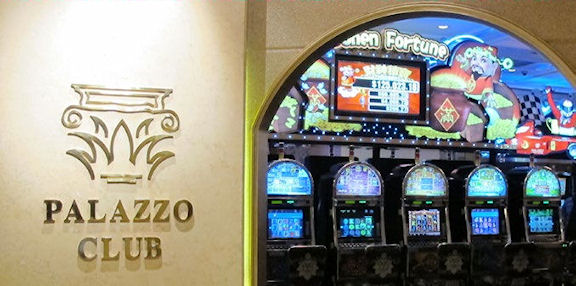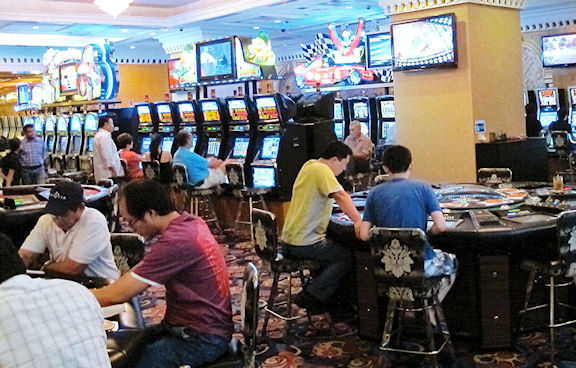This article first appeared in the Sep/Oct 2012 issue of World Gaming magazine.
One of the most attractive things about playing slot machines is the chance of winning a life-changing sum of money in a single press of a button. But what happens when these machines malfunction?

When you consider the huge multi-linked jackpots on slot machines, even high rollers like The Dragon can blush at the enormous amounts of money up for grabs. But what happens if there is a major machine malfunction and the casino’s world comes crashing down?
You might say the house deserves what it gets, but it’s not that simple and a major malfunction can create shock waves that impinge on players’ abilities to partake in forms of gaming they enjoy.
In October 2009, Ly Sam, a Vietnamese-American, visited the Palazzo Club at the Sheraton Hotel in Ho Chi Minh City and played a game entitled “The Landlord”. Upon playing the slot machine, Ly Sam looked up and saw the number “555,422,567” appearing on the machine’s credit meter, which equated to just over US$55 million! Sam says he thought he had won this huge amount and informed the staff of his “win”.
To cut a long story short the machine had malfunctioned. The amount that Ly Sam had wagered was not enough to win such a massive windfall and the symbols shown on the machine didn’t even amount to a high payout. BMM Singapore, an independent gaming-testing laboratory, verified that the slot machine in question had indeed malfunctioned. Given the bet denomination of ten cents, the maximum possible prize should have been around US$7,500.

The Palazzo Club denied Ly Sam the US$55 million and offered to refund him the US$3,000 he had bet that day, as a “make good” for the mix up. Ly Sam refused and filed a lawsuit. The Palazzo Club is disputing Sam’s claim and with a long list of supporting evidence that this was a malfunction and not a legitimate win it’s going to be interesting to see in whose favor the courts rule.
For many years, Vietnam has been toying with the idea of expanding its casino market. The Vietnamese government has been paying a great deal of attention to Singapore’s burgeoning casino industry and is keen to borrow ideas on how this could be done in Vietnam. Prior to 2003, gambling of any kind was illegal in Vietnam, with the exception of the state-run lottery. Since then, the government has allowed a few hotels and resorts to run small-scale casinos as “entertainment centers”, catering to foreigners only.
A few hotels have been granted licenses to operate slots and electronic betting games. Vietnam’s finance minister, Vuong Dinh Hue, sees casinos as a revenue generator, and for obvious reasons. The casino industry helps to promote tourism, which in turn brings much-needed foreign capital to the country. Asian Coast Development, a Canadian company, is building two large casino resorts near Ho Chi Minh City. The company also has plans to construct five Las Vegas-style integrated resorts and two entertainment centers in the city. Asian Coast Development has already invested US$4.2 billion and its first facility, the MGM Grand project at Hồ Tràm, is slated to open in 2013 with 541 hotel rooms, 90 tables and around 500 slot machines.

Inside the Palazzo Club at the luxurious Sheraton hotel in Ho Chi Minh City
Las Vegas Sands is also eager to partake in Vietnam’s budding casino industry. The company plans to invest US$6 billion in gaming complexes located in Ho Chi Minh City and Hanoi. Clearly, many companies see Vietnam as fertile ground in which to establish their gaming businesses.
However, Vietnam’s plan to effectively develop its casino industry will be thwarted if its courts rule in favor of Ly Sam. This present case has attracted much attention both domestically and abroad because of the large amount involved. If Ly Sam is awarded the payment then you could see why current and future investors would be very hesitant to invest in the industry in Vietnam.
In other parts of the world, circumstances where slot machines have malfunctioned are rare and the courts are reluctant to award amounts “won” in such circumstances. In a malfunctioning slot machine case in the US in 2000, Nevada’s Supreme Court upheld the Nevada Gaming Board’s decision rejecting Cengiz Sengel’s claim to a US$1.7 million win at Silver Legacy Casino. In another similar case in 2002, Mississippi’s Supreme Court upheld the Tunica County Court’s decision rejecting Brenda Pickle’s claim to US$4.7 million at Sam’s Town Casino. Similarly in 2007, the Macau gaming regulator rejected a woman’s claim to US$5.5 million at StarWorld.
The concerning thing in this case is that the Vietnamese court system does not have a long list of gaming related case law to rule from. This is very much a test case in the country and whenever this happens strange decisions can result. Casinos owe a duty of care to their patrons and they should be legally responsible for making sure they go to great lengths to prevent this sort of thing from happening. But malfunctions (just like human error) do happen on occasion and it would be a tragedy to see an entire industry put in jeopardy for what appears to be a relatively simple slot machine malfunction.
We here at WGM see the Ly Sam case as an unfortunate incident but hopefully sanity will prevail, and the Vietnamese courts will reject the claim, allowing the Vietnamese gaming industry to continue to grow.







